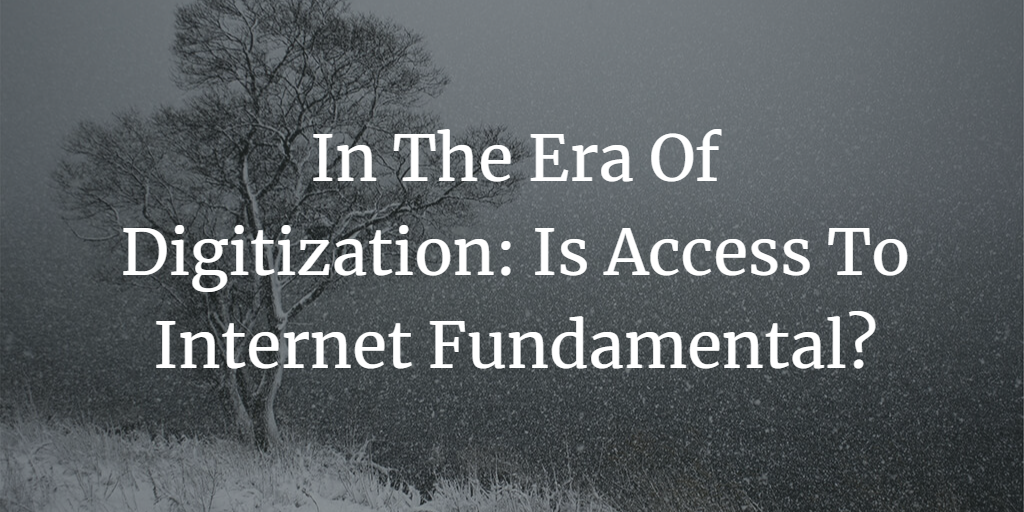In The Era Of Digitization: Is Access To Internet Fundamental?

Table of Contents
Introduction
Why Access to the Internet is Crucial
Internet as a Fundamental Right: Indian Perspective
Challenges in Ensuring Internet Access
Policy Measures to Improve Internet Access
Conclusion
Introduction
As India continues to embrace digitization in various sectors, the importance of internet access has become increasingly evident. The internet plays a critical role in promoting social, economic, and political development, leading to the debate on whether access to the internet should be considered a fundamental right. This article examines the Indian perspective on this issue and explores the challenges and policy measures to ensure internet access for all.
Why Access to the Internet is Crucial
Access to the internet has become vital for several reasons:
Economic opportunities: The internet enables individuals to access new job opportunities, enhance their skills, and engage in e-commerce activities.
Education: Online learning resources and digital platforms have become essential for educational institutions and students, especially during the COVID-19 pandemic.
Healthcare: Telemedicine and access to health information through the internet can significantly improve healthcare services, particularly in remote and underserved areas.
Governance: E-governance initiatives can enhance transparency, efficiency, and citizen participation in government processes.
Internet as a Fundamental Right: Indian Perspective
In recent years, the Indian judiciary has recognized the importance of internet access. In the 2019 case Anuradha Bhasin v. Union of India, the Supreme Court of India declared that the right to freedom of speech and expression under Article 19(1)(a) of the Indian Constitution includes the right to access the internet. The court, however, emphasized that this right is not absolute and can be subject to reasonable restrictions.
While access to the internet has not been explicitly recognized as a separate fundamental right in India, its connection to the right to freedom of speech and expression highlights its growing significance in the era of digitization.
Challenges in Ensuring Internet Access
Several challenges need to be addressed to ensure universal internet access in India:
Digital divide: The disparity in internet access between urban and rural areas, as well as among different socio-economic groups, continues to persist.
Infrastructure: Inadequate infrastructure, such as limited network coverage and unreliable connectivity, hinders internet access in many regions.
Affordability: The cost of internet-enabled devices and data plans can be prohibitive for low-income households.
Digital literacy: A lack of digital literacy and awareness can limit the effective use of the internet, particularly among older and less educated individuals.
Policy Measures to Improve Internet Access
To address these challenges and promote internet access as a fundamental right, several policy measures can be implemented:
Infrastructure development: Investing in the expansion and improvement of internet infrastructure, particularly in rural and remote areas.
Affordable connectivity: Implementing policies and initiatives to make internet-enabled devices and data plans more affordable for all income groups.
Digital literacy programs: Developing and promoting digital literacy programs to ensure that people can effectively use the internet and benefit from it.
Public internet access: Establishing public internet access points, such as community centers and libraries, to ensure that everyone has the opportunity to access the internet.
Encouraging private sector involvement: Incentivizing private sector investment in internet infrastructure and digital services to improve coverage, quality, and affordability.
Data protection and privacy: Strengthening data protection and privacy regulations to build trust and confidence in internet usage among citizens.
Conclusion
In the era of digitization, access to the internet has become increasingly important for social, economic, and political development in India. While not explicitly recognized as a separate fundamental right, its connection to the right to freedom of speech and expression highlights its growing significance. Addressing the challenges in ensuring universal internet access and implementing effective policy measures will be crucial in realizing the potential of the internet as a tool for empowerment and progress in India.


